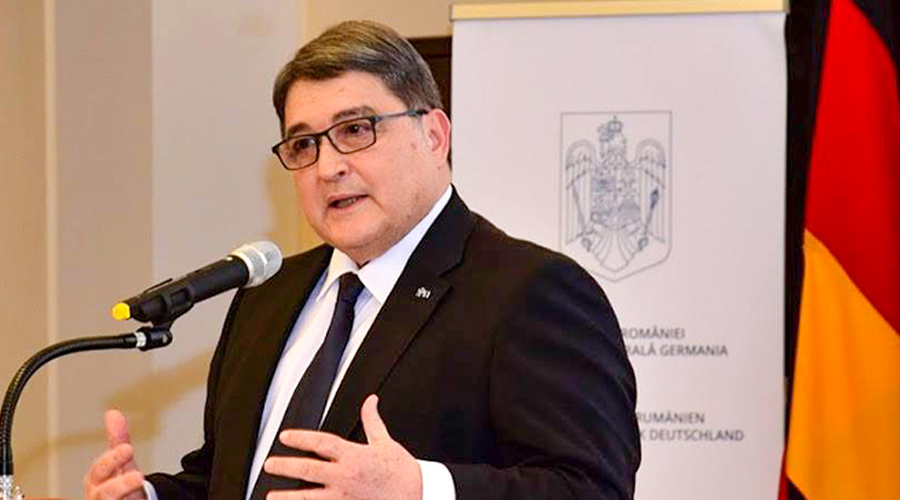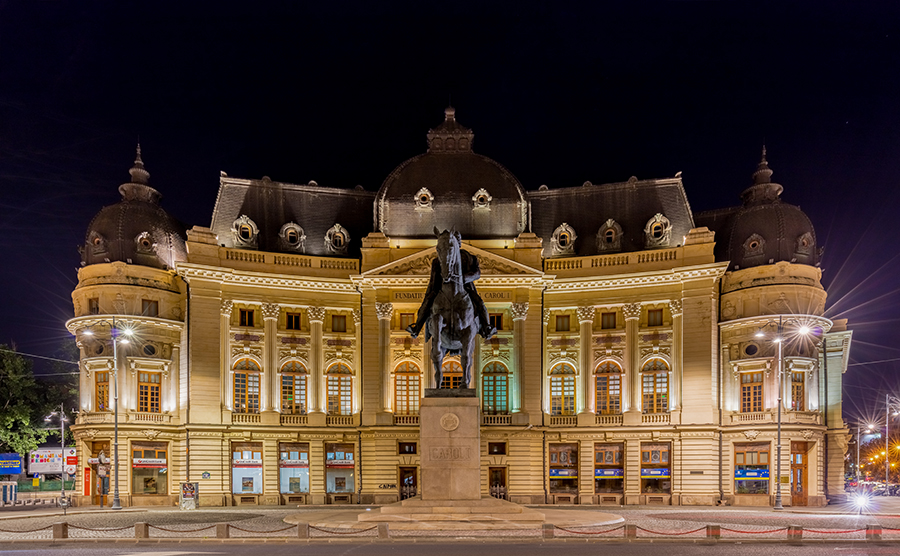
Emil Hurezeanu has been known in Romania for three decades thanks to his contribution to radio and television productions, as well as his print output in books and articles. During the first 15 years of this century, he produced many successful shows on Romanian radio and TV, mostly regarding foreign policy. Now, as the country’s ambassador to Germany, he uses his prior experience of living in that country and his intellectual’s ability to analyze the political moment to advance Romania’s European integration
After a successful career in journalism, you became ambassador to Germany in 2015. What brought you into this role what have your biggest challenges been as a diplomat?
I was a political refugee in Germany in the 1980s, working in the Romanian department of Radio Free Europe, an organization that historians say contributed a lot to keeping alive an awareness that democracy and freedom were still possible during the Communist period. So before and during the events of 1989, we were among the main protagonists of pre-revolution and post-revolution Romania. Then, in 1994, I went to work for Deutsche Welle in Cologne, and in 2002, I returned to my country. I think that spending those years outside Romania gave me a broader view of the transition period. So I have experience of Germany, and I know how the political system and society function, which probably explains why in 2014 the newly elected President Klaus Iohannis put my name forward for the position of ambassador. The journalist and the diplomat have things in common: they both scrutinize reality in a spirit of curiosity, trying to understand it better for the benefit of the people. They have to enter a kind of negotiation with businessmen, politicians, members of civil society and so on, and for these reasons, I had no inferiority complex on becoming Romania’s ambassador in Berlin. Journalism did not lose too much, while diplomacy has benefited moderately from me being here, if you allow me this self-critical remark. The biggest challenges have been the migration crisis of 2015, and what is becoming a political revolution in the region. A new Europe has emerged in the past five years, with the rise of authoritarian populism. In no country in Europe, East or West, can anyone be sure these days that the political situation will advance smoothly. There is an identity crisis, or a series of identity crises, starting with Greece in 2010, the migration, Islamic terrorism and populism crisis, and now Brexit and uncertainty over the future of Europe.
As a long-term observer of Romania-German bilateral relations, what is your assessment of how the relationship has changed over the years and where it stands today?
Germany is our most important commercial partner and the biggest investor in Romania. Bilateral trade is growing at between five and 10 percent yearly. In 2007, the trade volume between the countries stood at €8 billion; now it is €32 billion. German industry has created 300,000 jobs in Romania, more than it has in Great Britain. OK, you can say that Britain did not have such a need for job creation, but the fact remains an eloquent one. And many of these jobs are in the high-tech automotive industry. Then, there is the cultural tradition that unites our countries; from 19th-century Romantic artists to princes, aristocrats and politicians, our elite has always come to Germany to study. At the start of the 12th century, a large Saxon community settled in the Transylvania area. In 1938, on the eve of WW2, there were 800,000 Germans living in Romania as a historic minority, and the same number of Jews. Unfortunately for us, these two minorities, which had had a huge impact on the development of Romania, virtually disappeared. The small number who made it through the war emigrated during the Communist period. Germany is the biggest European economy and is also a dynamic factor in terms of coagulating Europe against centrifugal forces. To what extent the German-French political project will continue to exist and function, we will see. We have had an experience of paranoid nationalism under Ceausescu. Today, we are one of most pro-European nations; 70 percent want to stay in the EU and develop the Union. Almost five million Romanians work in the EU, especially in Spain and Italy, but also including 600,000 in Germany. There are also probably some 500,000 descendants of Romanian Germans living in this country, so we have a huge diaspora here. Bucharest is a one-hour, 50-minute flight from Berlin, and there are various connections between all major German and Romanian cities. In Transylvania, only 20,000 German Romanians remain, but their cultural heritage lives on. The incredible fortress churches are now restored by Romanians; it is a form of European patrimony that is very precious to us.
This year, Romania took over the presidency of the EU Council for the first time. This leadership role corresponds with a historic time for the EU as it faces Brexit and takes steps towards incorporating new countries in the Western Balkans. What is the narrative regarding the EU’s future that you are trying to convey?
Amidst the dangers of a deluded EU, our first priority is cohesion, European cohesion. The problem is thinking that we cannot stay together anymore – this fantasy of being free atoms, of each being ourselves – against the EU instead of within it. Brexit is the biggest example, but there are others. Some say that 70 years of peace is the limit to which mankind can enjoy freedom before starting a new conflict; I don’t know. On the other hand, there is uncertainty provoked by globalization: people feel they cannot control their own lives or their jobs; there is the rise of China; and a sense that the political interests of Brussels are not connected to people’s own needs and interests. Modern technology is also playing a part. Angry young people have this absolute and unbelievable freedom of communication, but, at the same time, they are recharging themselves with hate speech and feelings of undue competition, fury and animosity. You can see this on webchats and on Facebook. You have unease and fury connected with the most advanced technical means mankind has ever produced, and all of this contributes to a sense of disarray in Europe.

What do you say to those who have expressed doubts over Romania’s capacity to lead Europe at this time?
Romanian politicians of all sides often skirmish and mutually accuse each other of not understanding Europe. Transferring our own domestic quarrels to Europe, especially at such a sensitive moment as the taking over of the Council presidency, was not the most inspired intellectual or political approach. That is why there were doubts expressed by politicians in other countries, who also have their reasons not to be impressed by some recent reforms in the country, with some changes to concepts that are imperative for the rule of law. There have been concerns and doubts, as well as some misperceptions. We are a very nervous society; Neo-Latin and also Balkanic. We have since focused on the European agenda and the presidency. We have contributed significantly to the Gas Directive, bringing about a compromise solution to a very controversial subject. We completed 240 files during the first third of our mandate, more than were managed by some of our predecessors. The commissioners are very satisfied with our results so far. We have a very difficult presidency, including the Brexit negotiations and European elections, the latter leading to a kind of limbo period where there are no political forces present to negotiate with. The Summit on the Future of Europe will be held on May 9 in Sibiu, and there we will be able to discuss the EU’s strategic agenda.
Will Germany become an even more important partner for Romania after Brexit, assuming this does, in fact, take place?
Germany will become a more important partner for everyone because the number two contributor – the UK – will be gone, so Germany will have to improve its financial contribution to the EU, although not by that much. We also have on our agenda the completion of the negotiation of restructuring the Union’s finances, but this will probably be best resolved by the German presidency next year.
What makes Romania an attractive investment destination for Germans?
We have very easygoing legislation regarding the registration of companies, so in three weeks you can have a company. In Germany, you need longer. We have a well-educated workforce, which is competitive in terms of costs. We also have a strong industrial tradition, and we have so many companies producing automotive parts, from Daimler to BMW and more. This is a sign that our workforce is well trained. We are a friendly nation; one German investor who has eight factories across Europe told me that he has been everywhere, but nowhere else was he invited to someone’s home every evening right from the outset of the project. We also have a good knowledge of foreign languages; other Eastern European countries had a more restrictive language policy with Russian given predominance, and also dubbed foreign films on TV, whereas we have always had subtitles. We had the possibility of learning French and German at high school, and that difference is still noticeable. So, linguistic and industrial capabilities combine with competitive costs compared to Western European countries, giving us an edge over Poland and Hungary. This is the recipe of our success.
What makes Romania a must-visit location and how the country is trying to bring in more international tourists?
We were once a tourists’ paradise with our Black Sea coast, which we share with Bulgaria. We have a tremendous variety – including the sea, fertile plains and mountains – that gives us a geographical richness comparable to that of France. And, of course, we have a favorable climate. We have wonderful villages and an eclectic mix of cities. Look at cities like Cluj, Sibiu, Iași, Constanța and Brasov; they have been inhabited by Germans, Romanians, Jews and Hungarians. Bucharest is known as the little Paris of the East, with buildings that recall Parisian boulevards and the historical quarters of other great cities, such as Berlin. We need to improve our road network, and we are still talking mainly about potential as a tourist destination. We are still to be discovered.